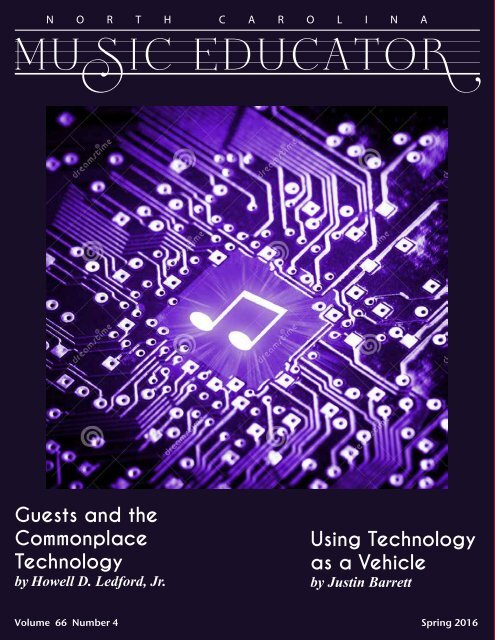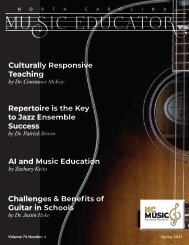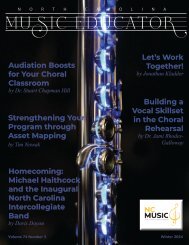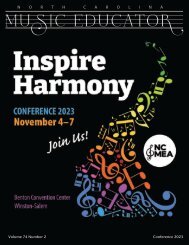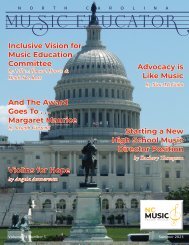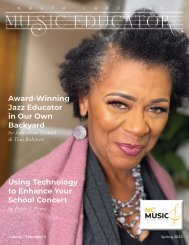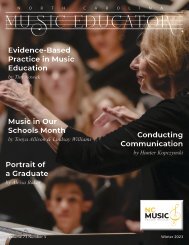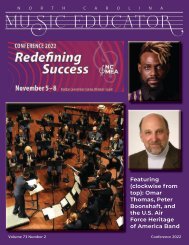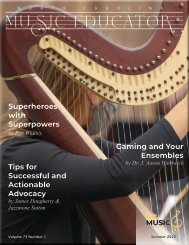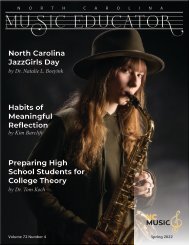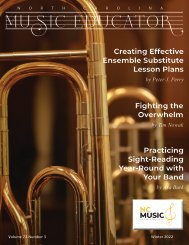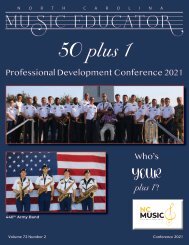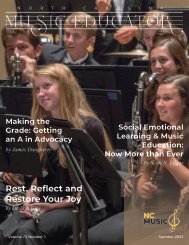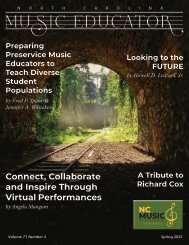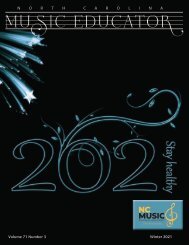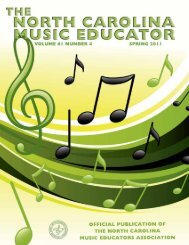NC Music Educator Spring 2016
North Carolina Music Educators Association Journal Spring 2016
North Carolina Music Educators Association Journal Spring 2016
- No tags were found...
Create successful ePaper yourself
Turn your PDF publications into a flip-book with our unique Google optimized e-Paper software.
N O R T H C A R O L I N A<br />
MUSIC EDUCATOR<br />
Guests and the<br />
Commonplace<br />
Technology<br />
by Howell D. Ledford, Jr.<br />
Using Technology<br />
as a Vehicle<br />
by Justin Barrett<br />
Volume 66 Number 4 <strong>Spring</strong> <strong>2016</strong><br />
NORTH CAROLINA MUSIC EDUCATOR | 1
2 | NORTH CAROLINA MUSIC EDUCATOR
The stage awaits.<br />
Find your place.<br />
music.wcu.edu<br />
NORTH CAROLINA MUSIC EDUCATOR | 1
N O R T H C A R O L I N A<br />
MUSIC EDUCATOR<br />
<strong>NC</strong>MEA Board Directory<br />
<strong>NC</strong>MEA President’s Message<br />
James Daugherty<br />
<strong>NC</strong>MEA Executive Director’s Message<br />
Pat Hall<br />
FEATURED ARTICLES<br />
Guests and the Commonplace Technology<br />
Howell D. Ledford, Jr.<br />
Using Technology as a Vehicle<br />
Justin Barrett<br />
COLUMNS<br />
Band Chair’s Message<br />
Elementary Chair’s Message<br />
Middle School Choral Chair’s Message<br />
Orchestra Chair’s Message<br />
Higher Education Chair’s Message<br />
In Memorium<br />
Accolades<br />
High School Choral Chair’s Message<br />
Technology Chair’s Message<br />
Download the NAfME Mobile App<br />
today and you’ll have access to<br />
your <strong>NC</strong>MEA membership number<br />
and more, all at your fingertips!<br />
Available for smart phones and<br />
tablets in your app store.<br />
2 | NORTH CAROLINA MUSIC EDUCATOR<br />
3<br />
4<br />
6<br />
16<br />
26<br />
8<br />
12<br />
18<br />
20<br />
21<br />
21<br />
21<br />
22<br />
24<br />
A special thank you to all our advertisers who<br />
support music educators and music education in<br />
North Caroina.<br />
The <strong>Music</strong> Center<br />
Western Carolina University<br />
Vivace Productions<br />
University of <strong>NC</strong> – Charlotte<br />
East Tennessee State University<br />
Yamaha<br />
University of <strong>NC</strong> – Greensboro<br />
East Carolina University<br />
Brevard College<br />
Creative Motion<br />
National Guild of Piano Teachers<br />
Mars Hill University<br />
Hayes School of <strong>Music</strong><br />
University of <strong>NC</strong> – Wilmington<br />
Inside Front Cover<br />
1, 13<br />
7<br />
9, 25<br />
10<br />
11<br />
14 – 15<br />
17<br />
19<br />
20<br />
21<br />
23<br />
27<br />
Inside Back Cover<br />
Editorial: All editorial content should be sent to: Kimberly<br />
Justen, Editor-in-Chief, at journal_editor@ncmea.net.<br />
Advertising: Information requests and ad orders should be<br />
directed to Kimberly Justen, Editor-in-Chief, at journal_<br />
editor@ncmea.net.<br />
Advertising deadlines:<br />
Summer/Fall: June 1 (delivery in July)<br />
Conference: August 10 (delivery in October)<br />
Winter: December 1 (delivery in January)<br />
<strong>Spring</strong>: March 1w (delivery in April)<br />
North Carolina <strong>Music</strong> <strong>Educator</strong> is copyrighted. Reproduction<br />
in any form is illegal without the express permission of<br />
the editor.<br />
Postmaster: Send address changes to: <strong>NC</strong> <strong>Music</strong> <strong>Educator</strong>,<br />
c/o <strong>NC</strong>MEA, 883-C Washington Street, Raleigh <strong>NC</strong> 27605.<br />
Non-Profit 501(c)(3) Organization U.S. Postage Paid at<br />
Lubbock, Texas. ISSN Number 0400-3332 EIN number<br />
20-3325550
Board of Directors<br />
EXECUTIVE OFFICERS<br />
President: James Daugherty<br />
jdaugherty@ncmea.net<br />
Immediate Past President:<br />
Richard Holmes<br />
rholmes@ncmea.net<br />
President-Elect: Jazzmone Sutton<br />
jsutton@ncmea.net<br />
Recording Secretary: Aria Westbrook<br />
recording_secretary@ncmea.net<br />
Member-at-Large: Andy Carter<br />
member-at-large1@ncmea.net<br />
Member-at-Large: Jeffrey Danielson<br />
member-at-large2@ncmea.net<br />
DISTRICT PRESIDENTS<br />
District 1: Jennifer Fowler<br />
district1@ncmea.net<br />
District 2: Patty Fayssoux<br />
district2@ncmea.net<br />
District 3: Jessica Ferguson<br />
district3@ncmea.net<br />
District 4: Helen Sigler<br />
district4@ncmea.net<br />
District 5: Lois Parris<br />
district5@ncmea.net<br />
District 6: Monica Adams<br />
district6@ncmea.net<br />
District 7: Lillie Allmond Harris<br />
district7@ncmea.net<br />
District 8: Brian Barfield<br />
district8@ncmea.net<br />
District 9: Pamela Collings<br />
district9@ncmea.net<br />
District 10: Pauline Reimers<br />
district10@ncmea.net<br />
District 11: John Philip Mullinax<br />
district11@ncmea.net<br />
District 12: Altrovise Terry<br />
district12@ncmea.net<br />
District 13: Gena Wiltshire<br />
district13@ncmea.net<br />
District 14: Gregory Shreckengost<br />
district14@ncmea.net<br />
District 15: Jenifer Hutson<br />
district15@ncmea.net<br />
Band: Alice Aldredge<br />
band_chair@ncmea.net<br />
Band Section Delegate: Brent Harris<br />
band_delegate@ncmea.net<br />
Collegiate NAfME: JaQuan Wiley<br />
collegiate_president@ncmea.net<br />
Elementary: Jazzmone Sutton<br />
elementary_section@ncmea.net<br />
High School Choral: Ed Yasick<br />
hschoral_chair@ncmea.net<br />
Higher Education: Gloria Knight<br />
higher_education@ncmea.net<br />
Exceptional Children & General <strong>Music</strong>:<br />
Rue S. Lee-Holmes<br />
exeptionalchildren_generalmusic@ncmea.net<br />
Conference Chair: Barbara Geer<br />
conference_chair@ncmea.net<br />
Asst. Conference Chair: Adam Joiner<br />
conference_assistant@ncmea.net<br />
Mentoring: Beth Ulffers<br />
mentoring_program@ncmea.net<br />
Multi-Cultural Awareness:<br />
Johnathan Hamiel<br />
multi_cultural_awareness@ncmea.net<br />
<strong>Music</strong> In Our Schools Month:<br />
Angela Mangum<br />
miosm_chair@ncmea.net<br />
<strong>Music</strong> Program Leaders: Nathan Street<br />
music_program_leader@ncmea.net<br />
AWARDS, GRANTS & SCHOLARSHIP<br />
CHAIRS<br />
Awards: Jeffrey Danielson<br />
member-at-large2@ncmea.net<br />
Mini Grant: Richard Holmes<br />
rholmes@ncmea.net<br />
Summer Professional Development<br />
Grant: Greg Hurley<br />
teacher_education@ncmea.net<br />
Scholarships: Andy Carter<br />
member-at-large1@ncmea.net<br />
SECTION CHAIRS<br />
COMMISSION & COMMITTEE CHAIRS<br />
Jazz Education: David Wortman<br />
jazz_chair@ncmea.net<br />
Jazz Section Delegate:<br />
Josh Cvijanovic<br />
jazz_delegate@ncmea.net<br />
Middle School Choral: Stephanie Peo<br />
mschoral_chair@ncmea.net<br />
Orchestra: Margot Holloman<br />
orchestra_chair@ncmea.net<br />
Orchestra Section Delegate:<br />
Joey Walker<br />
orchestra_delegate@ncmea.net<br />
Research: Jennifer Walter<br />
research_chair@ncmea.net<br />
Retired Membership: David S. Albert<br />
retired_membership@ncmea.net<br />
Student Activities: Jazzmone Sutton<br />
jsutton@ncmea.net<br />
Teacher Education: Greg Hurley<br />
teacher_education@ncmea.net<br />
Technology Chair: Amy Koo<br />
technology_chair@ncmea.net<br />
Tri-M: Windy Fullagar<br />
tri-m@ncmea.net<br />
Webmaster: Justin Barrett<br />
technology_webmaster@ncmea.net<br />
Young Professionals: Lisa Qualls<br />
young_professionals@ncmea.net<br />
STANDING COMMITTEE CHAIRS<br />
Advocacy: Jonathan R. Drye<br />
advocacy_committee@ncmea.net<br />
Constitution: Maribeth Yoder-White<br />
constitution_committee@ncmea.net<br />
Finance: Richard Holmes<br />
rholmes@ncmea.net<br />
Membership: Jazzmone Sutton<br />
jsutton@ncmea.net<br />
Publications: Kim Justen<br />
journal_editor@ncmea.net<br />
Collegiate NAfME Advisor: Lisa Runner<br />
collegiate_advisor@ncmea.net<br />
Editor: Kim Justen<br />
journal_editor@ncmea.net<br />
EX-OFFICIO MEMBERS<br />
Executive Director: Pat Hall<br />
pathall@ncmea.net<br />
Historian: Dr. John Henry, Jr.<br />
historian@ncmea.net<br />
<strong>Music</strong> Industry Rep.: Scott Love<br />
music_industry_rep@ncmea.net<br />
State Department of Public Instruction<br />
Rep.: Christie M. Lynch Ebert<br />
christie.lynchebert@dpi.nc.gov<br />
NORTH CAROLINA MUSIC EDUCATOR | 3
President’s Message<br />
James Daugherty<br />
As educators we often are presented with new<br />
initiatives or ideas. If you’ve been in our profession<br />
for any length of time the ideas don’t seem so new.<br />
Often, they’re regifted just for our benefit.<br />
Our school district leadership has recently embarked us<br />
on a different type of journey in an effort to get to the heart<br />
of what is important and critical for students and teachers in<br />
today’s classroom. In all honesty, though, this journey isn’t<br />
new or novel, but is more of a mindset shift.<br />
The journey is really a focus on five standards of<br />
instruction that include higher order thinking skills, depth of<br />
knowledge, connectedness to the world beyond the classroom,<br />
substantive conversation, and<br />
social support for student<br />
achievement.<br />
Sounds very academic,<br />
doesn’t it? I thought so, too,<br />
at first. After further reflection<br />
through this journey, I believe<br />
these standards to be more<br />
realistic than academic. In<br />
fact, these standards lay a firm<br />
foundation for everything that<br />
happens day to day in our<br />
classrooms and are at the core<br />
of how music teachers have<br />
been enriching the lives of their<br />
students for many years.<br />
Higher Order Thinking<br />
requires students to manipulate<br />
information and ideas in ways that transform their meaning.<br />
Without realizing it, music students embody these traits<br />
every time they perform as they synthesize the language of<br />
music from what they read on the page and transform it into<br />
a meaningful interpretation for themselves and the audience.<br />
For years our music students have learned and teachers<br />
have taught in ways that exceed lower order thinking where<br />
students only recite facts or employ repetitive routines just<br />
to “get through the test.” <strong>Music</strong> students consistently “think<br />
beyond the bubbles.”<br />
Inherent to great music classrooms are students and<br />
teachers who have a Depth of Knowledge that exceeds<br />
their non-music peers. Their ability to articulate musical<br />
emotions and responses through complex understanding is<br />
such a valued life skill. The way musicians approach their<br />
craft, often through an initial lens of sight reading a musical<br />
work, allows movement from a surface understanding to a<br />
production model where they utilize days, weeks, or months<br />
to hone, refine, or redefine their product. Through it all, they<br />
solve musical puzzles and challenges with a systematic and<br />
connected approach. This is the very essence of how music<br />
educators prepare for MPA every year. Because of the depth<br />
of knowledge skills we employ, our musicians are trained for<br />
mastery, not simple exposure.<br />
When we think about what we teach in our classroom<br />
every day, Connectedness to the World Beyond the<br />
Classroom is an element where the knowledge we impart<br />
on our students through music is a vehicle for future growth<br />
and learning. Perhaps this is the area where musicians do<br />
it best and in a different kind of way. While you won’t see<br />
students in a music classroom doing a graphic organizer of<br />
statistical data they collected on environmental changes from<br />
a local pollutant, you will<br />
see them using music as their<br />
vehicle to deal with issues<br />
such as the loss of a life, the<br />
spirit of patriotism when local<br />
military heroes return home<br />
from foreign soil, and sharing<br />
common musical experiences<br />
in an All-District or All-State<br />
music clinic when the student<br />
beside you plans to attend<br />
Yale and major in international<br />
business. The connectedness to<br />
the world beyond the classroom<br />
truly exists when we look at<br />
real statistics of the number<br />
of music students whose lives<br />
are enriched because of music,<br />
at the number of students who<br />
graduate successfully because music reached them in a way<br />
no other course did, and we look at statistics of national<br />
leaders and executives who have music training in their<br />
educational pedigree. <strong>Music</strong> is a core connection to the real<br />
world.<br />
<strong>Music</strong> educators who are also conductors of an ensemble<br />
likely cringe at the word talking, however, Substantive<br />
Conversation in the classroom is a needed vehicle<br />
for students to form and make connections. If we shift<br />
our mindset from a classroom that is filled with social<br />
conversation to a classroom formulated like a private music<br />
lesson, the type of conversation that leads to learning begins<br />
to take shape and mold into a useful tool. When used with<br />
an engaging focus, substantive conversation helps us interact<br />
with our students to make distinctions, apply ideas, and form<br />
generalizations. The sharing and exchanging of ideas that lead<br />
to an improved collective understanding of any instruction,<br />
including music, is critical. <strong>Music</strong> may be one of the few<br />
curricular areas where conversation is achieved non-verbally,<br />
yet is still as valid as verbal conversation.<br />
4 | NORTH CAROLINA MUSIC EDUCATOR
Imagine reframing our students’ thought processes so they<br />
understand their music making is conversation and expression<br />
of thought. Some of our best memories of learning music<br />
came from a great teacher who taught us one-on-one. We<br />
finally got it because we were imitating the sound or style of<br />
what we were hearing from our teacher. How often did we<br />
get it with no verbal conversation? Taking moments in our<br />
teaching and rehearsal to allow for many different forms of<br />
substantive conversation will prove to be a highly effective<br />
teaching strategy.<br />
Of all the things music does as well – if not better – than<br />
any other subject, it’s the Social Support for Student<br />
Achievement. Of all the strategies we are using, the focus of<br />
this strategy is on high expectations, respect, and inclusion of<br />
all students in the learning process. Taking risks and trying<br />
hard to master challenging work is a hallmark of music<br />
instruction. One of my fondest memories of social support<br />
for my own achievement musically was playing in a faculty<br />
jazz band at Cannon <strong>Music</strong> Camp. As a tuba player filling<br />
in on trombone, I was asked to take a solo in the rehearsal.<br />
With knowledge of my very poor improvisation skill, I was<br />
literally scared to death, especially being surrounded by such<br />
talented players. Of course, I heard a thunderous exclamation<br />
of support as I was being convinced to try a solo. While music<br />
is important because it stands alone, it is nice to know the<br />
intrinsic value and nature of music’s support is manifested for<br />
us in so many social, emotional, and literal manners.<br />
Today, we are preparing students in our classrooms for<br />
jobs that don’t yet exist. We’re working with students who are<br />
visual, who like to try and see, who want to be “facilitated”<br />
not taught, students who love to ask questions, to know how<br />
something will effect “me,” and want to utilize their smart<br />
phones to find an answer rather than recall the answer on a<br />
test. “Generation Z” uses technology more then ten hours a<br />
day and is predicted to have 17 jobs in their lifetime, living in<br />
15 different places.<br />
How will we reach thesm? We will reach these students<br />
because we have things to offer that they can’t find in other<br />
courses. Congress has paved the way for us to be a substantial<br />
and formative part of every student’s life by enumerating<br />
music as a core subject in the Every Student Succeeds Act<br />
(ESSA).<br />
ESSA is the new federal education law approved in<br />
December 2015 to replace No Child Left Behind. States<br />
are required to develop their own ESSA plan to comply<br />
with the federal law. <strong>Educator</strong>s, parents, students and other<br />
stakeholders of North Carolina’s public schools are invited<br />
to attend six public comment sessions scheduled for April<br />
and May across the state. We hope that you will attend one of<br />
these meetings near you so music educators have a voice in<br />
these important comment sessions.<br />
As we prepare for our April Board Meeting we have<br />
several projects underway:<br />
Membership<br />
Jazzmone Sutton, our President-Elect, and Pat Hall<br />
had a great planning session with Thomas Stefaniak,<br />
NAfME Director of Constituency Engagement and<br />
Organizational Development preparing our <strong>Spring</strong> <strong>2016</strong><br />
Membership Recruitment Campaign.<br />
March was the kickoff for this campaign. You will recall<br />
we had a tremendously successful membership campaign last<br />
year but we are not content to stop there. Our membership<br />
committee has been hard at work contacting new and lapsed<br />
members in an effort to strengthen our connections in<br />
supporting music education in North Carolina. Now, more<br />
than ever, membership in NAfME and <strong>NC</strong>MEA is such a<br />
value as our national and state associations partner on the<br />
important ESSA legislation and issues that affect us daily in<br />
the classroom.<br />
<strong>NC</strong>MEA Professional Development Conference<br />
By the time this school year ends, a multi-million-dollar<br />
renovation at the Benton Convention Center in Winston-<br />
Salem will be underway. In February, a representative crosssection<br />
of the <strong>NC</strong>MEA Board met with Benton representatives<br />
to discuss the renovations and plan for our conference to<br />
move forward during this process.<br />
We reviewed the plans for the renovation process, layouts<br />
and floor plans for the updated convention center, and a<br />
time-line for completion. The updated center will feature a<br />
complete interior make-over, new lighting, blackened ceilings<br />
in what we know as the exhibit area, some expanded spaces,<br />
better sound equipment, up-to-date dividing walls in the large<br />
rooms, and a much more modern feel and utilization of space.<br />
Representatives for sections and areas most affected by the<br />
loss of the upper floor have developed a plan to move forward<br />
with minimal impact. I encourage each of you to continue to<br />
support our conference with your attendance. We won’t let a<br />
little dust and inconvenience detour us from our mission!<br />
Analysis of Student Work<br />
As we close out this year and look ahead into the <strong>2016</strong>-<br />
2017 school year we have been told that all school districts in<br />
North Carolina will be utilizing the ASW process as a measure<br />
for student growth. It is our intention as an organization to<br />
support our members in as many was as possible in navigating<br />
this process. Our leadership will continue to have a visible<br />
presence at presentations, conferences, and meetings where<br />
ASW is discussed and do our best to represent the interests of<br />
music educators state-wide as the ASW process is imagined<br />
and reimagined.<br />
Looking Ahead<br />
Thank you for an incredible year of music making and<br />
reaching students in your classrooms and rehearsal rooms.<br />
It’s been a pleasure to hear some the incredible talent that you<br />
have produced at many MPA events, All-District and All-State<br />
clinics, local musicals, and in your classrooms across our<br />
state. North Carolina is filled with wonderful music teachers<br />
who bring music into the lives of their students every single<br />
day. <strong>Music</strong> is the place where we belong.<br />
I hope your school year has been the best ever and your<br />
summer will give you time to relax and rejuvenate as you<br />
prepare for next year. Our leadership team will travel back<br />
to Washington, D.C. in late June to join our colleagues from<br />
across the nation and continue to champion the cause of music<br />
for all of our students.<br />
On behalf of the Board, thank you for all that you do. You<br />
are the best!<br />
James<br />
NORTH CAROLINA MUSIC EDUCATOR | 5
Notes from the Executive Director<br />
Pat Hall<br />
I<br />
hope your read about and participated in some of <strong>NC</strong>-<br />
MEA’s Advocacy efforts over the last year. Here is a recap<br />
or our efforts and the results.<br />
Every Student Succeeds Act (ESSA) was signed into law<br />
by President Obama on December 10, 2015. The new version<br />
of the Elementary and Secondary Education Act (ESEA)<br />
replaces No Child Left Behind. NAfME and MEAs around<br />
the country worked hard to gain support for the bill on Capitol<br />
Hill. #<strong>Music</strong>StandsAlone means that for the first time the<br />
word “music” is enumerated as a well-rounded subject in the<br />
language of the legislation. The passage of the bill is only the<br />
beginning. Now with opportunities to use federal funding to<br />
increase access to music education for all students, we all can<br />
provide input on how this is implemented in our schools and<br />
communities. NAfME has created an ESSA implementation<br />
tool kit that can be found on their website nafme.org. Here in<br />
North Carolina, <strong>NC</strong>MEA will participate in a series of public<br />
input sessions conducted by the Department of Public Instruction<br />
to gather feedback that will inform the drafting of North<br />
Carolina’s ESSA plan. Stay tuned.<br />
<strong>NC</strong> House Bill 138 Arts Education Requirement is a bill<br />
requiring one unit in the arts for high school graduation which<br />
can be taken in any grade 6 – 12. The specifics of how a credit<br />
is defined will be determined by the State Board of Education.<br />
The bill passed the House in March with a bipartisan vote of 96<br />
to 21. It was sent to the Senate Rules Committee where it still<br />
sits (as of this writing). With the lobbying efforts of our friends<br />
at Arts <strong>NC</strong>, we hope to move the bill out of the Senate Rules<br />
Committee and put before a Senate vote this spring.<br />
<strong>NC</strong> House Bill 539 Charter School Funding requires that<br />
charter schools receive funds from grants and gifts made to<br />
public schools that are not clearly restricted to the individual<br />
public school’s use. The bill did not pass and was withdrawn<br />
from the calendar. We were concerned because the language in<br />
the bill was not clear and may have unintended consequences<br />
for gifts to your booster clubs.<br />
<strong>NC</strong>MEA Member Wins <strong>2016</strong> Grammy<br />
<strong>Music</strong> <strong>Educator</strong> Award<br />
All of us at <strong>NC</strong>MEA were ecstatic when CBS<br />
This Morning announced Phillip Riggs, Instructor<br />
of <strong>Music</strong> at the North Carolina School of<br />
Science & Math, Durham, won the <strong>2016</strong> Grammy<br />
<strong>Music</strong> <strong>Educator</strong> Award! It was even more<br />
thrilling to see Phillip being introduced during<br />
the Grammy Awards broadcast on February 16.<br />
The Grammy <strong>Music</strong> <strong>Educator</strong> Award is a joint partnership<br />
and presentation of The Recording Academy and the GRAM-<br />
MY Foundation. It was established to recognize current educators<br />
(kindergarten through college, public and private schools)<br />
who have made a significant and lasting contribution to the<br />
field of music education and who demonstrate a commitment<br />
to the broader cause of maintaining quality music education in<br />
schools. This year, more than 4,500 nominations were submitted<br />
nationwide. Phillip Riggs is the third recipient of this award<br />
that comes with a $10,000 honorarium.<br />
“There is no greater recognition than being nominated by a<br />
former student who is now a successful music teacher. My efforts<br />
to foster music education in North Carolina really stand on<br />
the shoulders of numerous students, parents, peers, administrators,<br />
and communities that value quality music in our society,”<br />
stated Phillip Riggs when he was named a Top 10 finalist.<br />
<strong>NC</strong>MEA President, James Daugherty states, “We are honored<br />
to have one of own members, Phillip Riggs, recognized<br />
as the <strong>2016</strong> national winner of the Grammy <strong>Music</strong> <strong>Educator</strong><br />
Award for his lifetime dedication to<br />
music education across North Carolina.<br />
From his first days of teaching<br />
he has been a dynamic music<br />
educator and has always represented<br />
the ideals and sense of collaborative<br />
teamwork that <strong>NC</strong>MEA and<br />
NAfME embodies for our members.<br />
“Throughout his career and<br />
through so many service roles in<br />
music education, Phillip has truly<br />
brought music into the lives of<br />
people all across North Carolina.<br />
The impact and contributions of<br />
Phillip Riggs<br />
his music teaching will be felt for<br />
generations. We are so proud of the<br />
innovation Phillip has brought to the many music education<br />
hats he has worn and his desire to always do what’s right and<br />
what is best for students. On behalf of our <strong>NC</strong>MEA members,<br />
we congratulate Phillip and join him in celebrating this lifetime<br />
achievement.”<br />
6 | NORTH CAROLINA MUSIC EDUCATOR
NORTH CAROLINA MUSIC EDUCATOR | 7
B<br />
and<br />
Alice Aldredge, Chair<br />
As we say in racing country where I live, we’ve rounded<br />
the fourth turn! The end of the year is in sight and you<br />
are surely preparing for your final concerts of the year<br />
with spring concerts, graduations, and such. While graduation<br />
and ceremonial performances can sometimes seem like a drag,<br />
don’t discount the importance these public performances have<br />
on the PR aspect of your program. Sometimes these are the<br />
largest audiences our concert groups will perform for throughout<br />
the entire school year. It’s an awesome chance to show off<br />
your students’ hard work to a greater segment of your community.<br />
Finish strong, and be sure you are making preparations for<br />
next year as well. A band director’s work never ends!<br />
North Carolina All State Honors Band Clinic<br />
The <strong>2016</strong> <strong>NC</strong> All State Honors Band Clinic was held on the<br />
campus of U<strong>NC</strong> – Chapel Hill, April 29-May 1. We welcomed<br />
clinicians Rachel Maxwell for the Middle School, Scott Rush<br />
for the High School, and Dr. Rebecca Phillips for the Senior<br />
High School.<br />
Rachel Maxwell attended Illinois<br />
State University on a full music scholarship<br />
and graduated in 1993 summa cum<br />
laude with a bachelor’s degree in music<br />
education. She received a master of <strong>Music</strong><br />
Education degree from the University<br />
of Illinois in 1997. In 2003, she completed<br />
a Master of Educational Leadership<br />
degree from Aurora University. She has<br />
also completed additional coursework<br />
in team-building, leadership and working<br />
with diverse students. Maxwell has<br />
Rachel Maxwell taught band in the West Aurora School<br />
District (1993-95) and in the Oswego<br />
School District (1995-present).<br />
Maxwell currently serves as the director of bands and<br />
webmaster at Traughber Junior High School and as the Junior<br />
High Performing Arts and Band Coordinator for the district.<br />
She has taught music education courses at VanderCook College<br />
of <strong>Music</strong> in Chicago and North Central College in Naperville,<br />
Il., and has been invited to be a guest conductor, clinician and<br />
adjudicator at a number of music camps and festivals.<br />
Under her direction the bands at Traughber JHS have<br />
received national acclaim and have performed at The Midwest<br />
Clinic, the Illinois <strong>Music</strong> <strong>Educator</strong>s Association All State<br />
Conference, the University of Illinois Super-State Festival and<br />
at the ASBDA 2004 National Convention. The Jazz Bands have<br />
performed at the North Shore Jazz Festival, <strong>Music</strong> in the Parks,<br />
Jazz in the Burbs, IGSMA Band Contest, Oswego Jazz Nite,<br />
Oswego Junior High Band Festival and Hackney`s.<br />
Scott Rush is currently the director of fine and performing<br />
arts for the Dorchester Two School District in South Carolina.<br />
8 | NORTH CAROLINA MUSIC EDUCATOR<br />
Prior to his appointment, he was director<br />
of bands at Wando High School in Mount<br />
Pleasant, South Carolina from 1999 –<br />
2014. He is a graduate of the New England<br />
Conservatory of <strong>Music</strong> in Boston, Massachusetts,<br />
where he received a Master of<br />
<strong>Music</strong> degree in French horn performance<br />
and studied with Boston Symphony principal<br />
hornist, Charles Kavalovski. He was a<br />
Concerto Competition winner and member<br />
of the Boston Philharmonic under Benjamin<br />
Zander. Rush received his bachelor’s<br />
degree from the University of South<br />
Carolina where he studied under Robert<br />
Scott Rush<br />
Pruzin and was the recipient of the Arthur Fraser Award for the<br />
Outstanding Graduating Senior in <strong>Music</strong>.<br />
As director of bands at Wando High School, The Wando<br />
Symphonic Band performed at the 2007 Midwest International<br />
Band and Orchestra Clinic and was the 2007 recipient of the<br />
Sudler Flag of Honor, administered by the John Philip Sousa<br />
Foundation. The Wando Marching Band was named a finalist at<br />
the Bands of America Grand National Championships in 2009<br />
and 2011. They were also SC State 5A<br />
marching band champions from 2005<br />
2013.<br />
Rush is active as a conductor, clinician<br />
and adjudicator throughout the<br />
United States. He has presented clinic<br />
sessions at major conferences in seventeen<br />
states, including the 2006 and<br />
2013 Midwest International Band and<br />
Orchestra Clinic, and has presented<br />
workshops for several universities and<br />
school districts. He is the author of two<br />
highly touted books, Habits of a Successful<br />
Band Director and The Evolution of a<br />
Rebecca Phillips<br />
Successful Band Director for GIA Publications.<br />
Dr. Rebecca Phillips is the director of bands at Colorado<br />
State University, where she conducts the CSU Wind Symphony<br />
and guides all aspects of the band and graduate wind conducting<br />
program. Prior to this appointment, she served as the associate<br />
director of bands, director of athletic bands, and associate<br />
professor at the University of South Carolina where she was<br />
responsible for directing the Symphonic Winds Concert Band,<br />
The Mighty Sound of the Southeast Carolina Marching Band,<br />
Concocktion Pep Bands, teaching undergraduate instrumental<br />
conducting, and directing the Carolina Summer Drum Major<br />
Clinic.<br />
Phillips has served as a guest conductor, clinician, and<br />
performer throughout North America, Europe, and Asia. She
The U<strong>NC</strong> Charlotte<br />
Department of <strong>Music</strong><br />
music.uncc.edu<br />
Bachelor of <strong>Music</strong><br />
Choral/General <strong>Music</strong> Education<br />
Instrumental/General <strong>Music</strong> Education<br />
Instrumental Performance<br />
Vocal Performance<br />
Bachelor of Arts in <strong>Music</strong><br />
Option of minoring or double-majoring in<br />
another subject<br />
Certificate in Jazz Studies<br />
NORTH CAROLINA MUSIC EDUCATOR | 9
egularly conducts collegiate honor bands and All State bands<br />
across the country and she has been a rehearsal clinician at the<br />
Midwest Clinic: An International Band and Orchestra Conference.<br />
Ensembles under her direction have been featured at the<br />
2012 College Band Director’s National Association Southern<br />
Division Conference, the 2010 Society of Composers International<br />
Conference, and the 2008 North American Saxophone<br />
Alliance International Convention.<br />
She believes in treasuring the traditional wind music of<br />
the past as well as promoting cutting edge works of today’s<br />
finest composers. As a trombonist, her performances can be<br />
found on several internationally distributed recordings. She<br />
has performed with the National Symphony Orchestra, U.S.<br />
Army Band (Pershing’s Own), the Tallahassee Symphony,<br />
and the Tampa Bay Opera Orchestra. She has also performed<br />
internationally in England, Mexico, the Caribbean, Russia, and<br />
Sweden, and has toured as a trombonist with Johnny Mathis and<br />
Barry Manilow.<br />
A special highlight of our weekend was the <strong>NC</strong>BA Hall of<br />
Fame induction ceremony. The <strong>NC</strong>BA Hall of Fame was started<br />
in 2002 as a way to honor some of our most outstanding band<br />
directors. Since its inception, the <strong>NC</strong>BA has inducted sixty-five<br />
band directors to the Hall of Fame. On May 1, <strong>2016</strong>, just prior<br />
to our All State concert, we inducted James Crayton, Winn<br />
Justice and Ed Whitener to this esteemed group. These directors<br />
have made a significant contribution to the improvement of music<br />
education and betterment of the profession. Applications for<br />
the 2017 <strong>NC</strong>BA Hall of Fame are due by July 1, <strong>2016</strong>. Criteria<br />
and the application can be found on the <strong>NC</strong>BA Website.<br />
The entire North Carolina All State Honors Band clinic<br />
weekend would not be a success without the tireless work of<br />
many dedicated professionals. The auditions site chairs, Rodney<br />
Workman and Wesley Richardson; the auditions chairs, Susan<br />
Fritts, Laradon Pilot, and Russell Knight; clinic chairs, Jamie<br />
Bream, Daved Roberts and Karen Williams-Lanning; state<br />
webmaster, Ruth Petersen for our online audition and clinic<br />
registration and event information; president elect, Rodney<br />
Workman for organizing the new music reading listening areas<br />
and <strong>NC</strong>BA Hall of Fame; and our All State Honors Band Clinic<br />
host, Jeffrey Fuchs. Please be sure to thank these directors for<br />
all the work they do to serve the North Carolina Bandmasters<br />
Association.<br />
Each of my articles contains a long list of accomplishments<br />
and acknowledgements showing we clearly we have a lot to<br />
celebrate in our fine organization! Words can hardly express<br />
the sense of pride I had as I joined you at the TV and on social<br />
media following our own Phillip Riggs as the <strong>2016</strong> Grammy<br />
<strong>Music</strong> <strong>Educator</strong> Award Winner. While I am so proud of Phillip<br />
and the way represents our organization, I know there are<br />
hundreds of you in the trenches sacrificing everyday to make<br />
positively life-changing experiences for your students through<br />
music. Hold your head high, be proud, and thank your students,<br />
parents, administrators, colleagues, and family members who<br />
motivate you in this blessed calling. Take some time to rest<br />
and rejuvenate this summer and come back ready to once again<br />
change students’ lives and Strike up the Band!<br />
DEPARTMENT OF MUSIC<br />
10 | NORTH CAROLINA MUSIC EDUCATOR<br />
• Bachelor of <strong>Music</strong> degrees in<br />
Performance, Education, and Jazz<br />
• Competitive scholarships, by audition<br />
• Dedicated faculty<br />
• All-Steinway School<br />
• Master classes with renowned artists<br />
• Numerous ensembles, including<br />
Marching Band<br />
Life Is Better <strong>Music</strong><br />
with<br />
PO Box 70661 | Johnson City, TN | 423-439-4270 | www.etsu.edu/music
NEW Yamaha<br />
Intermediate Flutes<br />
The Yamaha line of Intermediate flutes has been updated to surpass the<br />
evolving needs of student flutists. Featuring an industry-leading pointed<br />
key arm design and a complete review and update to many aspects of the<br />
production process, the 300 and 400 series Intermediate flutes emphasize<br />
the Yamaha consistency and quality that keeps these flutes strong and<br />
singing for youn g flutists.<br />
• The keys of the new Intermediate flutes have been redesigned with the<br />
pointed key arm style which is vertically integrated from Professional<br />
and Handmade flutes<br />
• Mechanical redesigns and material changes result in increased<br />
resistance to corrosion and longer playing life for the instrument<br />
• Pad cup structures now feature the same style and thickness as<br />
the Professional and Handmade line , for a more precise seal and<br />
increased durability<br />
• The 300 series flute body is nickel-silver with a sterling silver headjoint,<br />
while the 400 series is completely sterling silver. Both styles help retain<br />
a clean polished look and a rich singing sound.<br />
• All intermediate flutes now come with a French-style case and a durable,<br />
E-style case cover<br />
For more information please visit: 4wrd.it/intf<strong>NC</strong>ME<br />
NORTH CAROLINA MUSIC EDUCATOR | 11
Elementary<br />
Jazzmone Sutton, Chair<br />
In January, the elementary board met to discuss and review<br />
our previous conference, reviewing suggestions and ideas<br />
from submitted conference surveys. With this information,<br />
we began brainstorming sessions for the Professional Development<br />
Conference. It’s our aim to offer engaging and applicable<br />
sessions to our educators. We cannot reach this goal without<br />
your help. Your suggestions and ideas are welcome at our email<br />
address, elementary_section@ncmea.net.<br />
We are excited to announce Henry Leck as the <strong>2016</strong> Honors<br />
Chorus clinician. As an internationally<br />
recognized choral director, Leck is a professor<br />
emeritus in choral music at Butler University,<br />
where he served on faculty for 27 years. He is<br />
the founder and artistic director of the Indianapolis<br />
Children’s Choir, one of the largest and<br />
most respected children’s choir programs in the<br />
world.<br />
Leck has received many honors including<br />
the Sagamore of the Wabash and the State of<br />
Indiana Distinguished Hooiser Award. He and<br />
the Indianapolis Children’s Choir received the<br />
Indiana Governor’s Arts Award, the highest arts<br />
honor one can receive in Indiana. Recently, he<br />
was named a recipient of the Lowell Mason<br />
Fellows Award, the highest award given by the<br />
National Association for <strong>Music</strong> Education. Henry Leck<br />
Leck is widely known as a specialist in choral<br />
techniques, the child’s voice, Dalcroze Eurhythmics, Laban,<br />
and the boy’s changing voice. He has produced four teaching<br />
videos titled Vocal techniques for the Younger Singer; The<br />
Boy’s Expanding Voice: Take the High Road; Creating Artistry<br />
through Movement; and Dalcroze Eurhythmics and Creating<br />
Artistry with the Male Maturing Voice. He was a lead author for<br />
the choral textbook series published by McGraw Hill/Glencoe<br />
titled Experiencing Choral <strong>Music</strong> and is the lead author of a<br />
new series of textbooks entitled Voices in Concert. He is also<br />
the editor of two nationally known choral series published by<br />
Hal Leonard Corporation and Colla Voce, Inc. Each year he<br />
teaches an international conductor’s workshop at Butler University.<br />
He has recently written a textbook, Creating Artistry<br />
through Choral Excellence. He received his training from the<br />
University of Wisconsin – Stevens Point, the University of<br />
Colorado and Indiana University.<br />
To find more information on the audition piece, I encourage<br />
you to visit our Honors Chorus webpage, located in the<br />
Elementary Section of the <strong>NC</strong>MEA website. Please consider<br />
auditioning your students for this remarkable tradition and<br />
experience.<br />
A budding tradition at our conference is the student performance<br />
ensemble performances. The board is searching for<br />
talented performance ensembles to present at conference. These<br />
ensembles can be choral, drumming, string, recorder or Orff<br />
groups. We are especially looking for a choral group to work<br />
with clinician Carol Krueger of Valdosta State University in<br />
Georgia. If you are interested in bringing a performance group,<br />
please apply with the Student Performance/Clinic Application<br />
in the Student Events tab on the <strong>NC</strong>MEA website.<br />
Speaking of the website, take a moment and look through<br />
the various resources we have posted online for music educators<br />
under the Members Resource tab. The Children’s<br />
Literature database is a collection of books<br />
that can be used in the music classroom. These<br />
books are organized based upon various topics and<br />
musical elements. Be sure to take note of the colored<br />
tabs located near the bottom of the spreadsheet.<br />
Also posted is the Choral Repertoire database,<br />
which includes choral pieces for a variety of levels,<br />
voices and topics. Lastly, there is a collection<br />
of grants available by location/region or grant<br />
focus. Some of these grants are year-round resources.<br />
These three documents are living documents,<br />
meaning they will change and modify over time. If<br />
you have suggestions to add or edits, please email<br />
elementary_section@ncmea.net.<br />
As a reminder, the <strong>NC</strong>MEA Elementary Teacher<br />
of the Year award application is open until May 15.<br />
Administrators, fellow teachers, or professionals who<br />
have worked with an <strong>NC</strong>MEA Elementary teacher are encouraged<br />
to nominate a deserving teacher. See the Awards under the<br />
Elementary section tab for access to the nomination process and<br />
rubric.<br />
In preparation for the November conference, we wanted to<br />
inform members that the Benton Convention Center will be<br />
undergoing renovations. These renovations began in February<br />
of this year and will continue into conference time. The majority<br />
of the work that is planned during conference will be in<br />
the upper level of the Benton Convention Center. With this in<br />
mind, the typical conference spaces, clinic rooms and schedule<br />
may change. Please be assured that we will uphold the standard<br />
of an informative and engaging conference.<br />
Looking forward to the end of the year approaching, our<br />
schedules will began to fill quickly. I encourage all to take a<br />
moment to reflect and celebrate the beautiful and meaningful<br />
work that you play an important role in. During the summer, I<br />
hope you refresh your mind and body for the upcoming year.<br />
Thank you for all you do for music education in North Carolina<br />
and beyond.<br />
12 | NORTH CAROLINA MUSIC EDUCATOR
SUMMER SYMPOSIUM<br />
July 10-14, <strong>2016</strong><br />
WESTERN<br />
CAROLINA<br />
UNIVERSITY<br />
WIND TRACK<br />
DRUM MAJOR TRACK<br />
Don’t miss the chance to have an experience of a lifetime at<br />
Summer Symposium <strong>2016</strong>!<br />
Spend a week developing new skills, forging new<br />
relationships, and making memories to last a lifetime, all<br />
through the incredibly transcendent power of music!<br />
PICK YOUR EXPERIE<strong>NC</strong>E!<br />
Outstanding Track Options led by top clinicians from<br />
across the country!<br />
Bob Buckner<br />
Tom Case<br />
Andrew Craft<br />
Jessica Davis<br />
Amanda Drinkwater<br />
Sheldon Frazier<br />
Matt Henley<br />
Jon Henson<br />
Dillon Ingle<br />
Bobby Lambert<br />
Gary Markham<br />
Freddy Martin<br />
Scott McCormick<br />
Barry Morgan<br />
Victor Perez<br />
Bobby Richardson<br />
Damon Sink<br />
Richard Saucedo<br />
David Starnes<br />
Margaret Underwood<br />
FEATURING CAROLINA CROWN AND STAFF!<br />
PERCUSSION TRACK<br />
ROCK AND RECORD<br />
TRACK<br />
COLOR GUARD TRACK<br />
Prideofthemountains.com<br />
NORTH CAROLINA MUSIC EDUCATOR | 13
U N C G<br />
SUMMER MUSIC CAMP<br />
America’s Most Popular <strong>Music</strong> Camp<br />
Apply Online & Pay Online!<br />
Beginning February 1st at www.smcamp.org<br />
This year, all U<strong>NC</strong>G Summer <strong>Music</strong> Camp Applications will be<br />
completed by camp parents ONLINE at www.smcamp.org<br />
beginning February 1st. Once accepted, parents will be able<br />
to pay the $50 deposit online as well. Parents will need to<br />
have the name and email address of the student's primary<br />
music teacher in order to complete the ONLINE application.<br />
Attracting over 1,850 students, with a lengthy waiting list, the<br />
U<strong>NC</strong>G Summer <strong>Music</strong> Camp ranks as the largest and most<br />
popular university music camp in the United States. <strong>Music</strong><br />
camp students are under the leadership and guidance of the<br />
artist faculty of the U<strong>NC</strong>G School of <strong>Music</strong>, Theatre, and Dance long recognized as a national<br />
leader in excellence. In addition, distinguished music teachers, performers and conductors<br />
from the state and nation will join the staff of the U<strong>NC</strong>G Summer <strong>Music</strong> Camp to ensure that<br />
each student receives the highest quality instruction available. Each summer, more than<br />
160 professional teachers and musicians are employed as teachers and counselors at the<br />
U<strong>NC</strong>G Summer <strong>Music</strong> Camp.<br />
t<br />
t<br />
t<br />
t<br />
t<br />
t<br />
This is America’s largest and most popular university music camp.<br />
In 2015, 1,850 students attended the camp and were taught by a professional staff of<br />
over 160 musicians.<br />
Over the past 33 years, over 56,000 students have attended music camp from nearly<br />
every state and from numerous foreign countries including Canada, England, Belgium,<br />
Germany, Turkey, Taiwan, France, Italy, Austria, Japan, & China.<br />
Urge your students to apply early. We accepted 1,850 students into music camp last<br />
year, but many others had to be turned away. APPLY ONLINE in FEBRUARY!<br />
Complete package including instruction, all meals, air-conditioned dorm room,<br />
recreation and health plan is only $475. Private lesson is optional.<br />
In <strong>2016</strong>, the U<strong>NC</strong>G Summer <strong>Music</strong> Camp will host 15 Concert Bands, 4 Orchestras,<br />
4 Mixed Choruses and 160 Pianists.<br />
Visit our Web Site! www.smcamp.org<br />
Apply online beginning February 1st, <strong>2016</strong>.<br />
U<strong>NC</strong>G Summer <strong>Music</strong> Camp t PO Box 26170 t Greensboro, <strong>NC</strong> t 27402 t 1-800-999-2869<br />
14 | NORTH CAROLINA MUSIC EDUCATOR
SCHEDULE & FEES<br />
Apply Online & Pay Online!<br />
www.smcamp.org<br />
1st Week<br />
July 10 (Sunday) - July 15 (Friday)<br />
Senior High Band Grades 9 through 12<br />
Junior High Band<br />
Beginner Band<br />
Junior Orchestra<br />
Grades 6 through 8 and have<br />
played at least two years<br />
Played one year only<br />
Grades 5 through 9<br />
Grades 6 through 8 and have<br />
played at least two years<br />
Violin, viola, cello, bass<br />
Senior Orchestra Grades 9 through 12<br />
Violin, viola, cello, bass, winds<br />
& percussion<br />
Junior Mixed Chorus Grades 6 through 8<br />
Piano<br />
Grades 6 through 12 and have<br />
played at least two years<br />
2nd Week<br />
July 17 (Sunday) - July 22 (Friday)<br />
Senior High Band Grades 9 through 12<br />
Junior High Band<br />
Beginner Band<br />
Junior Orchestra<br />
Camp Schedule for <strong>2016</strong><br />
Grades 6 through 8 and have<br />
played at least two years<br />
Played one year only<br />
Grades 5 through 9<br />
Grades 6 through 8 and have<br />
played at least two years<br />
Violin, viola, cello, bass<br />
Senior Orchestra Grades 9 through 12<br />
Violin, viola, cello, bass, winds<br />
& percussion<br />
Fees<br />
Plan 1 - Complete Package $475<br />
6 days, 5 nights, 16 meals, air conditioned dormitory room,<br />
instruction, health care, and recreation.<br />
or $495 with a half-hour private lesson included<br />
or $515 with a one-hour private lesson included<br />
Plan 2 - Day Camp plus Meals $385<br />
for Local Residents<br />
Includes instruction, 16 meals, health care and recreation.<br />
Reporting time 8:30 a.m. (earlier if you wish to have<br />
breakfast) until 9:15 p.m.<br />
or $405 with a half-hour private lesson included<br />
or $425 with a one-hour private lesson included<br />
PIANO CAMP includes one hour of private lessons.<br />
Plan 1 = $515 Plan 2 = $425<br />
Applications & Payment of Fees<br />
Now Online!<br />
This year, all U<strong>NC</strong>G Summer <strong>Music</strong> Camp Applications<br />
will be completed by music camp parents ONLINE at<br />
www.smcamp.org beginning February 1st. Once accepted,<br />
parents will be able to pay the $50 deposit online as well.<br />
Parents will need to have the name and email address of<br />
the student's primary music teacher in order to complete<br />
the ONLINE application.<br />
Senior Mixed Chorus Grades 9 through 12<br />
Piano<br />
Grades 6 through 12 and have<br />
played at least two years<br />
Grade is determined by the current (2015-16) school year.<br />
U<strong>NC</strong>G Summer <strong>Music</strong> Camp t PO Box 26170 t Greensboro, <strong>NC</strong> t 27402 t 1-800-999-2869<br />
NORTH CAROLINA MUSIC EDUCATOR | 15
Guests and the<br />
Commonplace<br />
Technology<br />
by Howell D. Ledford, Jr.<br />
Personal devices including phones, tablets, and laptops<br />
with cameras are common to everyone. Millions of people<br />
have these devices and yet they are not used as much in<br />
the classroom.<br />
The major question is why? This technology has changed<br />
the way people communicate in the 21 st century. How can it<br />
make the everyday teacher’s life better?<br />
The question is easily answered. Users can bring guests<br />
into the classroom. Private lessons can be offered online. Value<br />
judgments can be made about performances. Self-reflection can<br />
be made from a video made on a device like this. All of these<br />
things can be done with a smart phone camera. Plus, the added<br />
savings of time and money make this a worthwhile technology<br />
to learn.<br />
Think of how much richer a classroom would be if your<br />
students could talk to experts. For example, a band or orchestra<br />
is playing a piece from a living composer. The composer can<br />
FaceTime or Skype into a classroom to hear rehearsal or talk<br />
about the piece with the students. Remember, all this takes is an<br />
expert, smartphone or laptop, cables, and a place for the expert<br />
to see the audience.<br />
Why aren’t educators using this technology if it is so commonplace?<br />
The reason boils down to commitment. This is a<br />
commitment of time and energy. Teachers do not want to commit<br />
time and energy learning a new piece of technology when<br />
so much technology is thrown at them already. Teachers have to<br />
learn Powerschools, Canvas, and any other learning or content<br />
management system (LMS and CMS respectively) their district<br />
throws their way.<br />
If one is to actually use technology, there is a certain level<br />
of commitment. So often people in general do not want or have<br />
time to figure out something new. “It takes too long.” Ask how<br />
long the setup time is in reality. Setting a phone to record a<br />
class does not take long. Setting a phone or laptop to bring in a<br />
guest takes a bit longer, but no more than ten to fifteen minutes<br />
if all the rest of the parts are in order. If all the parts are not in<br />
order, then it is a level of comfort. If setting up a camera phone<br />
takes too long, one should ask this question. “Are you comfortable<br />
doing the thing you want to do?”<br />
Comfort is the other reason for a lack of commitment.<br />
One should talk to their families and colleagues. Again, this<br />
technology is commonplace. There are countless numbers of<br />
people who use this tech fluently. Ask a tech facilitator, student,<br />
or friend. They should be able and willing to help. Typically,<br />
asking your friends will do the trick. Once the comfort level is<br />
up, the time it takes to set up a system should be minimal. This<br />
is just like practice.<br />
There is one more trick to success with technology. Learn<br />
the things you have/want to and nothing more. Some teachers<br />
are thrown a technology buffet and told, “You must eat it all.”<br />
Some get nothing and are told they must use technology. Some<br />
are in between. No matter what the situation, take the technology<br />
that has to get learned and learn it. Then choose one or<br />
two more pieces of technology at most. Learn that and only<br />
that. Learning it all is not productive and is overwhelming. No<br />
teaching will get done because there will be no time. No one<br />
wants to spend time they do not have. Keep the plate balanced,<br />
and try this bit of technology to help your students.<br />
Cell phones are an easy and inexpensive way to get guests,<br />
clinicians, videos, and other tools into your room for your<br />
students. Keep your plate balanced try one new thing this year.<br />
If you are going to try something, try this. It should be easy and<br />
fun for personal communications this year with someone for<br />
your students.<br />
Howell “Howie” Ledford is in his first year of teaching music<br />
production at Weaver Academy. Previously, he taught electronic music<br />
at Career Center High School in Winston-Salem. He has taught band<br />
and orchestra for fifteen years, serves as a marching band instructor<br />
for East Forsyth High School and is an associate conductor for the<br />
Wachovia Winds Youth Wind Ensemble.<br />
Ledford graduated from Mars Hill College/University in 2001<br />
with a BME and a minor in computer science. He earned a master’s<br />
in music from U<strong>NC</strong> –Greensboro in 2010, and is presently on the <strong>NC</strong>-<br />
MEA music technology committee. He can be reached at Ledforh@<br />
gcsnc.com.<br />
16 | NORTH CAROLINA MUSIC EDUCATOR
East Carolina University® School of <strong>Music</strong><br />
Earn a Master’s Degree in<br />
<strong>Music</strong> Education Online<br />
Develop your full potential and jump-start<br />
your career by obtaining your online master of<br />
music degree in music education in a nurturing<br />
atmosphere with other gifted and talented students.<br />
The MM in music education, pedagogical studies,<br />
offered entirely online, allows you the opportunity<br />
to align our program specifically to your professional<br />
goals through an interdepartmental approach.<br />
Master of music distance education classes are taught by the same excellent East Carolina University<br />
School of <strong>Music</strong> faculty that teach campus-based students.<br />
Dr. Michelle Hairston<br />
Chair, <strong>Music</strong> Education<br />
Dr. Gregory Hurley Dr. Jay Juchniewicz Dr. Raychl Smith Dr. Cynthia Wagoner<br />
For more information, contact Dr. Rachel Copeland, Coordinator of Graduate<br />
Recruitment, at skibar@ecu.edu or 252-328-6342, or visit ecu.edu/music.<br />
15-536<br />
NORTH CAROLINA MUSIC EDUCATOR | 17
Middle School Choral<br />
Stephanie Peo, Chair<br />
<strong>Music</strong> has a power of forming the character, and should therefore be<br />
introduced into the education of the young.<br />
– Aristotle<br />
It’s all Greek to me…Well, maybe not ALL<br />
Greek, because I certainly haven’t taken on<br />
that language to teach as part of my choral<br />
repertoire!<br />
Teaching general music in addition to chorus<br />
affords me the opportunity to overlap my<br />
curriculum with other academic areas, especially<br />
social studies, that students are learning<br />
on the other side of the building. Last<br />
week’s lessons focused on ancient music and<br />
the contributions of Greek philosophers such<br />
as Plato and Aristotle on music education.<br />
Pythagoras was part of the equation, too, of<br />
course! (Get it?)<br />
Plato gave music an important role in education,<br />
arguing the right kind of music disciplined<br />
the mind and aroused temperance and<br />
courage. Aristotle endorsed music for entertainment<br />
and for its role in drama. Pythagoras,<br />
who played the seven string lyre, related music to mathematics.<br />
He learned how harmonious the vibrating strings<br />
sounded when the lengths of the strings were proportional<br />
to whole numbers, such as 2:1 (octave), 3:2 (5th), 4:3 (4th).<br />
Our modern system of music theory and its vocabulary derive<br />
largely from ancient Greece. The Greek discipline of harmonics<br />
(matters concerning pitch) laid the foundation for modern<br />
concepts such as notes, intervals, scales, and modes. Greek<br />
scales were constructed from tetrachords, groups of four notes<br />
spanning a fourth. There were three genera (kinds) of tetrachords:<br />
diatonic, chromatic, and enharmonic. Yet, here we<br />
sit, in the 21st century uploading our digital ASW artifacts to<br />
“prove” the value of our work, wondering if that process will<br />
eventually meet the same fate as Pompeii.<br />
After several class periods linking general music to math, science,<br />
social studies and language arts, one of my sixth graders<br />
told me how smart he thought I was. He proceeded to ask my<br />
why, since I knew so much about “real” subjects, I decided to<br />
teach music. I smiled, relishing the opportunity to share what<br />
all arts educators know…. When we teach music, we combine<br />
concepts from all disciplines to create something exceptional.<br />
He nodded. He got it. Sort of.<br />
So, back to Chorus rehearsal. This year, several students who<br />
are good singers, participated in our All-County Chorus as<br />
a way to miss a day of school. Again, I just smiled and told<br />
18 | NORTH CAROLINA MUSIC EDUCATOR<br />
<strong>Music</strong> gives a<br />
soul to the<br />
universe, wings<br />
to the mind,<br />
flight to the<br />
imagination and<br />
life to everything.<br />
them they would get much more than just a<br />
free day! Bwahahaha! I promised them they<br />
would work hard all day, but would enjoy<br />
every minute, and come back to school<br />
with new knowledge of music and a deeper<br />
appreciation of quality rehearsals. They<br />
looked a little confused. Students who participated<br />
in All-State Chorus as 6th graders<br />
chimed in their agreement, and we proceeded<br />
to learn our madrigal.<br />
As I write this article, several of my students<br />
are preparing their music for All-<br />
State. They understand they are participating<br />
in something exceptional. I would like<br />
to again thank our coordinator Angel Rudd<br />
– Plato and our clinicians David Dobbins, Southeast<br />
Guilford Middle School (7 – 8 SATB);<br />
Erica Washburn, New England Conservatory<br />
of <strong>Music</strong> (7-8 Women’s Choir); and<br />
Robyn Lana, Cincinnati Children’s Choir (6th Grade Treble<br />
Choir) for their outstanding leadership of this event. I want<br />
to thank all of you who teach our students to love and understand<br />
the value of choral music and musicianship. Thanks also<br />
to Robert Waller and Lee Mabe for presenting an Honors Chorus<br />
audition seminar at All-State.<br />
I continue to be amazed at the way my students, from a variety<br />
of socio-economic backgrounds but predominantly low-income,<br />
fall in love with the songs they learn in Latin, French,
German, Spanish, and other languages. I relish the light bulb<br />
moments in which a connection is made between a classic<br />
poem or literary reference and my students’ life experiences<br />
or dreams. I watch proudly as members of our chorus sing<br />
enthusiastically in the extra-curricular gospel choir (not led by<br />
me) loving that style of music while demonstrating the best<br />
posture, breath support and most self-confidence in the group.<br />
As choral educators, we need to remember the experiences<br />
offered to students in our classrooms go far beyond the other<br />
instruction they receive in school. Sure, this article<br />
is a prime example of preaching to the choir,<br />
but someone reading this – perhaps everyone<br />
– needs the affirmation that we, and our work,<br />
are highly valuable. The lessons we teach will<br />
endure and enrich our students lives for many<br />
years to come.<br />
Email me (mschoral_chair@ncmea.net) or your<br />
favorite MS Choral Board member with questions<br />
and suggestions to improve our section!<br />
There is geometry in the ringing<br />
of strings. There is harmony in<br />
the spacing of the spheres.<br />
Brevard Choral<br />
Institute<br />
– Pythagoras<br />
The Future is Yours!<br />
Upcoming Dates and<br />
Deadlines<br />
<strong>2016</strong> Conference Choir Applications –<br />
Wed. June 15 - send to Eileen Kress<br />
2017 All State School Registration –<br />
Thurs. September 15 – send to coordinator<br />
Angel Rudd<br />
<strong>2016</strong> Honors Chorus Audition Registration<br />
– Thurs. September 15 – send to<br />
regional site chairs<br />
<strong>2016</strong> Honors Chorus Auditions:<br />
Brevard College, in association with<br />
the Brevard <strong>Music</strong> Center,<br />
invites high school choral singers<br />
to attend a one-week intensive<br />
at the Brevard Choral Institute this summer<br />
June 26 – July 2, <strong>2016</strong><br />
East – Wed. Sept. 28<br />
Central – Thurs. Sept. 29<br />
West – Fri. Sept. 30<br />
<strong>2016</strong> <strong>NC</strong>MEA Professional Development<br />
Conference – Sat. – Tues.<br />
November 5-8 - Winston-Salem<br />
Please continue to check the <strong>NC</strong>MEA<br />
MS Choral website regularly for updates<br />
and information.<br />
Register at brevard.edu/bci<br />
Contact information:<br />
Dr. David Gresham<br />
Director of Choral Activities<br />
Brevard College, greshada@brevard.edu<br />
One Brevard College Drive | Brevard, <strong>NC</strong> 28712 | www.brevard.edu<br />
NORTH CAROLINA MUSIC EDUCATOR | 19
Orchestra<br />
Margot Holloman, Chair<br />
<strong>Spring</strong>… that time of year when you are working hard on<br />
end of year concerts. I hope you can take just a moment to<br />
reflect on how far your students have progressed and what<br />
you’ve accomplished as teachers since that first day of orchestra<br />
class. Your dedication and passion for teaching have led<br />
your students to a new level of musical understanding, creative<br />
imagination, discipline and cooperation, intellectual curiosity,<br />
and self-confidence. You are changing lives through music!<br />
We have had several successful events so far this spring:<br />
The Eastern Regional Orchestra was<br />
held February 19 – 21, at the North Carolina<br />
School of Science and Math. Thank<br />
you to Joli Brooks for her outstanding<br />
leadership as chair. The String Orchestra<br />
was directed by Dr. Peter Askim, director<br />
of orchestral studies at North Carolina<br />
State University. The Symphony Orchestra<br />
was directed by Dr. Jorge Richter,<br />
director of orchestras at East Carolina<br />
University.<br />
The Western Regional Orchestra was<br />
held February 26-28, at Appalachian<br />
State University. Thank you to Sabrina Howard for her continued<br />
great leadership of this event. The Repertory Orchestra<br />
was directed by Kamine Haghighi, orchestra director at Walter<br />
Hines Page High School in Greensboro. The Symphony Orchestra<br />
was directed by Dr. Chung Park, director of orchestras<br />
Moved by music?<br />
CREATIVE MOTION<br />
at the<br />
East Carolina University<br />
July 1722, <strong>2016</strong> www.creativemotion.org<br />
and String <strong>Music</strong> Education at University of Central Florida.<br />
Congratulations to all of the students on their outstanding performances!<br />
The Eastern Regional MPA was held March 8-10, at Ligon<br />
Magnet Middle School in Raleigh. Thank you to Carrie Henderson<br />
for chairing this event. Askim, Dr. Mira Frisch, director<br />
of string chamber music at U<strong>NC</strong> – Charlotte, and Karen Huey,<br />
retired Lee County Schools orchestra teacher, served as adjudicators<br />
for the prepared performances. Dr. Jim Waddelow,<br />
director of string activities at Meredith<br />
College served as adjudicator for the<br />
sight-reading.<br />
The Western Regional MPA was held<br />
March 16-18, at Northwest School of the<br />
Arts in Charlotte. Erica Hefner chaired<br />
this event and did a wonderful job. Greg<br />
Barnes, University of South Carolina<br />
String Project, Dr. Gail Barnes, director<br />
of music education and USC String<br />
Project, and Dr. Greg Hurley, director<br />
of music education at East Carolina<br />
University served as adjudicators for the<br />
prepared performances. Frisch served as<br />
adjudicator for the sight-reading. Congratulations to the teachers<br />
and students on their performances!<br />
Please remember, requests for additions/changes/deletions<br />
to the <strong>NC</strong> Orchestra MPA Repertoire List must be received by<br />
June 30, <strong>2016</strong>. The forms are posted on the website<br />
under the MPA tab. Approved pieces will be added<br />
to the list and released to directors at the general<br />
business meeting in November. Contact me if you<br />
have questions about this process.<br />
Any requests for additions/changes/deletions to<br />
the <strong>NC</strong> Orchestra Section constitution, bylaws, or<br />
policies and procedures must be submitted to me in<br />
writing (email or mail) no later than June 30, <strong>2016</strong>.<br />
These requests will be introduced and discussed<br />
at the Regional Meetings, which will take place in<br />
September, and will be voted on at the Business<br />
Meeting during the <strong>2016</strong> <strong>NC</strong>MEA Professional<br />
Development Conference. Please continue to check<br />
the <strong>NC</strong> Orchestra Section website www.ncorchestra.org/wordpress<br />
for the latest updates and information.<br />
I wish you all the best as you work towards the<br />
end of your school year. Please feel free to contact<br />
me with any concerns, questions, or suggestions<br />
for our organization. My email is orchestra_chair@<br />
ncmea.net.<br />
20 | NORTH CAROLINA MUSIC EDUCATOR
H<br />
igher Education<br />
Gloria J. Knight, Chair<br />
In Memorium<br />
As Chair of the Higher Education section, greetings to<br />
everyone. The Higher Education committee was delighted<br />
to have NAfME President, Dr. Glen Nierman<br />
serve as a presenter during the 2015 annual <strong>NC</strong>MEA conference.<br />
Dr. Nierman presented his topics on Directions for Research<br />
in Pre-Service <strong>Music</strong> Teacher Education and Assessment<br />
in a Revised Standards Environment. The presentations<br />
provided enlightening and relevant information for institutions<br />
of higher learning and for K-12 schools. Dr. Nierman<br />
delivered a solid rationale for research and provided many<br />
examples of how research can benefit teachers. We gained<br />
much insight into what we teach and how we assess what we<br />
teach at various educational levels.<br />
For the upcoming year, the Higher Education Committee<br />
members will be looking forward to planning sessions that<br />
continue to promote music education for all. We hope to see<br />
all of you at the <strong>2016</strong> annual <strong>NC</strong>MEA conference.<br />
Accolades<br />
Congratulations to Windy<br />
Fullagar, Band Director at<br />
Alexander Graham Middle<br />
School, as a recipient of the<br />
<strong>2016</strong> ASC Cato Lifetime<br />
Achievement in Teaching<br />
Award! This award recognizes<br />
exceptionally creative teachers<br />
who have a distinguished<br />
career teaching the arts,<br />
sciences or history or who have demonstrated<br />
creative infusion of the arts, sciences or history<br />
into the core curriculum. In recognition of this<br />
achievement, Windy will receive a cash prize of<br />
$5,000 and a bronze medallion by <strong>NC</strong> artist Joanna<br />
Gollberg.<br />
Anthony “Tony” Groce, member of the <strong>NC</strong>MEA and<br />
the <strong>NC</strong> Bandmasters Association, passed away on<br />
February 25, <strong>2016</strong> at his home in East Bend, <strong>NC</strong>. He<br />
graduated with a bachelors and masters degree from Appalachian<br />
State University where he played trumpet in the marching<br />
band. Tony dedicated his live to teaching music. He taught<br />
band at Bunker Hill High School, Bessemer City High School,<br />
Shelby High School and retired from his alma mater Forbush<br />
High School in 2007.<br />
<strong>NC</strong>ME Feature Article Rotation Deadlines<br />
Summer/Fall: May 1<br />
Elementary | Orchestra | Advocacy<br />
Conference: August 10<br />
Items pertaining to conference<br />
Winter: December 1<br />
Research | Choral | Band<br />
<strong>Spring</strong>: February 15<br />
Technology | Jazz | Higher Education<br />
Feature article submissions should be sent<br />
to the appropriate section chair.<br />
Congratulations Windy! We are proud of you!!!<br />
NORTH CAROLINA MUSIC EDUCATOR | 21
H<br />
igh School Choral<br />
Ed Yasick, Chair<br />
I love to hear a choir. I love the humanity to see the faces of real people devoting<br />
themselves to a piece of music. I like the teamwork. It makes me feel optimistic about<br />
the human race when I see them cooperating like that.<br />
– Paul McCartney<br />
As I began writing this article, I came across this quote,<br />
which speaks to what we feel and why we are in the<br />
classroom. It is the cooperation and teamwork that<br />
make the wonderful experiences for our students and ourselves.<br />
Our music making brings everyone together through common<br />
goals. At my school, we just finished our Singing Valentines.<br />
It’s always such a joy to see the various groups build upon their<br />
strengths and decide what works best for their particular group.<br />
Singing Valentines also brings the entire school together for<br />
one day as individual students are sung to. Many teachers have<br />
told me that it is one of their favorite days of the year and what<br />
a positive energy our music brings to their classrooms.<br />
Now I think how there are just a few more weeks of winter<br />
to get through and MPAs are fast approaching. Thank you so<br />
much to Michelle Sullivan and all the site chairs for making<br />
sure MPAs run smoothly. I hope you and your students are<br />
able to perform at our district MPAs and also spend some time<br />
listening and supporting your colleagues and their programs.<br />
I would also ask that if you do not already do so, please<br />
have your groups sight read at MPA. It’s not as scary as you<br />
think; trust me. Directors have the opportunity to choose from<br />
four levels of difficulty, no matter the grade level of the repertoire<br />
you choose. Each level has two rhythmic exercises and<br />
two melodic/harmonic exercises composed in multiple voicings<br />
available to choose from. Students perform one rhythmic exercise<br />
and one melodic/harmonic exercise in the sight reading<br />
portion of the adjudication. In <strong>2016</strong>, we will again use the 2015<br />
sight reading books composed by our own Gwen Hall.<br />
By the time you read this article, we will have just finished<br />
our <strong>2016</strong> All-State Chorus Clinic. I am so excited and looking<br />
forward to hearing the four choirs in Raleigh again this year.<br />
Memorial Auditorium has had some renovations is looking<br />
great. Special thanks to Jeremy Truhel for working to make<br />
sure All-State is a success. All-State was held at the Raleigh<br />
Convention Center<br />
and the Duke<br />
Energy Center for<br />
the Performing Arts<br />
on April 29 – 30.<br />
Clinicians included:<br />
9 – 12 Women’s<br />
Choir: Dr. Andrea<br />
Ramsey, UC – Boulder;<br />
9 – 12 Men’s<br />
Choir: Dr. Jefferson<br />
Johnson, University<br />
of Kentucky; 9 – 10<br />
Mixed Choir: Dr.<br />
Randy Haldeman,<br />
22 | NORTH CAROLINA MUSIC EDUCATOR<br />
U<strong>NC</strong> – Charlotte; and 11 – 12 Mixed Choir: Dr. Dave Fryling,<br />
Hofstra University.<br />
Our 2015 Young Composer Showcase winner was Clayton<br />
Delp from Fuquay Varina High School. His composition,<br />
“Black and White,” was premiered at conference this past November<br />
by the Charlotte Latin Concert Choir, under the direction<br />
of Craig Estep. Special thanks to the committee members,<br />
Gwen Hall, chair, Stuart Chapman Hill, and Jesse Padgett, for<br />
choosing our winner this year. The <strong>2016</strong> Student Composition<br />
application is now on the website. Please encourage high<br />
school composers to submit their choral pieces for consideration<br />
for this award. Deadline for applications is June 1.<br />
At our business meeting at All-State, Eddie Adams, HS<br />
Choral Section Chair-Elect, presented a ballot of volunteers<br />
who are willing to serve our organization. At fall conference,<br />
members will vote on the following HS Choral Board offices:<br />
Chair-Elect, Choral Activities Chair, <strong>NC</strong> Honor’s Chorus Co-<br />
Chairs, All-State Chair, and Secretary. The officers will serve<br />
on the board from November <strong>2016</strong> through November 2018. If<br />
you would like to run for one of the offices listed, please contact<br />
Eddie Adams at jadams@wcpss.net.<br />
Our <strong>2016</strong> <strong>NC</strong>MEA High School Choral Section Hall of<br />
Fame inductees were recognized at the All-State Chorus Concert.<br />
Please consider nominating someone for the 2017 High<br />
School Choral Section Hall of Fame by emailing Carol Earnhardt<br />
at earnhardtcarol@yahoo.com. It is a wonderful opportunity<br />
to recognize those directors who impacted the lives of their<br />
students through the love of choral music, who were dedicated<br />
to the choral art, and who demonstrated leadership in <strong>NC</strong>MEA<br />
and in choral music in North Carolina.<br />
As we quickly come to the end of another school year, let<br />
me remind you of upcoming events for the fall:<br />
• Dr. Z. Randall Stroope, Oklahoma State University, will<br />
conduct our N.C. Honors Chorus Clinic November 5 – 6.<br />
It will be great to have him with us. Please encourage your<br />
students to audition for the choir. Deadline for submission<br />
of audition fees is September 10. Up-to-date information<br />
concerning N.C. Honors Chorus can be found at ncmea.net.<br />
• Send your nominations for Teacher of the Year to Cynthia<br />
Benton at cindyrbenton@yahoo.com.<br />
• Consider having your ensembles perform at Conference.<br />
• Please submit applications to me at hschoral_chair@<br />
ncmea.net. Deadline is May 15.<br />
I wish all of you the best in your end of the year concerts<br />
and other musical activities. Remember to take time to enjoy<br />
the music you and your students make together as you look forward<br />
to a much deserved summer break and some relaxation.
DEPARTMENT OF<br />
MUSIC<br />
The Mars Hill University Department of <strong>Music</strong> provides an<br />
environment in which musicians develop skills and gain<br />
knowledge essential to lifelong professional and personal<br />
success in artistic endeavors. The Department of <strong>Music</strong> has<br />
been a member of the National Association of Schools of<br />
<strong>Music</strong> (NASM) since 1950, a testament to the department’s<br />
tradition of excellence.<br />
Students interested in studying music at Mars Hill<br />
University should visit mhumusic.com<br />
NORTH CAROLINA MUSIC EDUCATOR | 23
Technology<br />
Amy Koo, Chair<br />
I<br />
am writing to you from icy Raleigh (it’s February), contemplating<br />
all the things happening in technology right<br />
now. We are still traveling down the path of one to one<br />
devices in our schools, but I find that many of the teachers<br />
who are looking for the most technology help are the ones<br />
who have little to no technology. I vividly remember being in<br />
that same situation many years ago.<br />
Every classroom in my school was in the process of being<br />
outfitted with SMARTboards, except<br />
mine. I had been pushed to a trailer<br />
and the principal was concerned<br />
about security. I had one several<br />
years-old laptop computer, and a<br />
projector in my room (and that had<br />
been purchased by a previous music<br />
teacher through a grant). It was hard<br />
for me to see the light at the end of<br />
the tunnel.<br />
Then one day I was helping<br />
the media specialist in my school<br />
clean out her storage room. I found<br />
boxes of blank CDs, tablets, remote<br />
systems, and an entire AlphaSmart<br />
Cart. When I asked her about them,<br />
her response was, “Those are so<br />
outdated none of the teachers want<br />
them anymore. Now they just collect dust!” I was not (and<br />
still am not) too proud to use old technology.<br />
I ended up using every bit of still-working technology in<br />
my room. Yes, I was the one finding out if it worked or not,<br />
and I had to put in the time to learn to use that old technology,<br />
but to me it was worth it. For those of us with creative minds<br />
(and really, that’s all of us, isn’t it?) turning a piece of outdated<br />
equipment into something useful is a challenge. Much of<br />
the technology in our schools, and similarly the technology<br />
collecting dust in storage rooms, is not made specifically for<br />
music education, but we can make use of it! Here are some<br />
ideas for those of us with very little technology:<br />
• Only one computer? Consider turning it into a learning<br />
center. Students can come to the center when they have<br />
finished their work early, or you can rotate the entire class<br />
through it one at a time (sometimes this takes multiple<br />
classes depending on how long your class is and how<br />
many students you have). You can also use this one computer<br />
in conjunction with Google Forms and have each<br />
child take an assessment or a survey while you are teaching<br />
the whole group. I also use Padlet (https://padlet.com)<br />
for after-performance group assessments and critiques.<br />
• Do not be afraid to mix and match technology! It’s not<br />
uncommon in my room to have students spread around<br />
the room answering surveys at a combination of two<br />
desktop computers, two laptop computers, two iPads, an<br />
iPad mini and a samsung tablet! Generally, the kids are<br />
great at making technology work regardless of the brand<br />
or model. My one piece of advice here is to use something<br />
that works cross platforms, like a website.<br />
• Never be too proud – to beg,<br />
take something old, ask for help,<br />
the list goes on. The media specialist<br />
and technology facilitators at<br />
your school know what is available<br />
and what is not being used, so<br />
make a point to ask! You can also<br />
check the online library database if<br />
your media specialist is up to date<br />
on adding technology.<br />
I hope this is helpful for all of<br />
you out there trying to figure out<br />
how to add that technology component<br />
to your lessons. The technology<br />
committee is working hard to plan<br />
sessions for next year’s conference<br />
that are both useful for the most<br />
technology-savvy educators out there<br />
as well as the teachers who are technology beginners. We will<br />
also be ramping up our Tech Pods for those of us who work<br />
better with hands-on technology. For those of you who were<br />
unable to attend any Tech Pods last year, these are great sessions<br />
providing a short presentation followed by time to work<br />
with the technology presented hands-on. The presenter sticks<br />
around to answer any questions you may have or walk you<br />
through the technology presented. I look forward to seeing<br />
you then!<br />
SAVE THE DATE<br />
24 | NORTH CAROLINA MUSIC EDUCATOR
Pride of Niner Nation<br />
Marching Band<br />
Inaugural Season<br />
Fall 2015<br />
marchingband.uncc.edu<br />
U<strong>NC</strong> Charlotte Marching Band<br />
@U<strong>NC</strong>CBands<br />
U<strong>NC</strong>CBands<br />
Scholarships are available<br />
to students from all majors.<br />
NORTH CAROLINA MUSIC EDUCATOR | 25
Use Technology as a Vehicle<br />
by Justin Barrett<br />
The sound of a positive, happy tech facilitator, first thing in<br />
the morning on a teacher workday geared up and ready to<br />
present the latest and greatest tool. The presentation goes<br />
a little something like this. “Good morning teachers! Welcome<br />
to your training session on insert really cool tool here!” You’ll<br />
then sit through hours of training on how to use this thing<br />
before being informed you’ll be using this in your courses for<br />
the foreseeable future. Unfortunately, the overwhelming truth<br />
behind it all is it sounds like a great idea, until it’s put into the<br />
perspective of actual practice.<br />
Let’s use an example. Many systems have adopted Google<br />
Classroom into their schools, providing training on how teachers<br />
can use it to deliver assessments and grades, and keep up<br />
with students’ work. Now, as a believer in Google, this sounds<br />
fantastic. Google is amazing in many ways, especially in their<br />
design to be cross-compatible and meet the device needs of everyone<br />
as well as their expansive array of tools and neat things<br />
they can offer. But let’s play this out:<br />
• County or school adopts Google Classroom;<br />
• Google does their thing and gets it all set up for use;<br />
• Teachers get training on how to use the tools available in<br />
Google Classroom;<br />
• Teachers are set free to do what teachers do and apply<br />
the tool in their classroom somehow;<br />
• Teacher arrives at their desk, cool tool in hand;<br />
…now what?<br />
Getting Started<br />
It’s a common misnomer, but the idea behind incorporating<br />
technology isn’t to use the tool to do something specific in a<br />
specific lesson. It’s to integrate the tool into your everyday routine<br />
and plan for it as part of normal lesson planning. There are<br />
many ways to do this, problem-based hybrid learning. This is a<br />
conglomeration of two separate ideas, put together to create an<br />
optimized learning environment adept for individual learning<br />
and group application of concepts.<br />
Problem-based learning is an instructional strategy in which<br />
the teacher provides a problem to the students in the form of a<br />
learning goal and gives them the tools required to achieve the<br />
goal. For example, without giving any formal lecture time on<br />
the topic, a teacher might provide students with an assessment<br />
on a piece of music which asks them to use Wikipedia to learn<br />
more about the piece. The students have Wikipedia, which is<br />
the only tool they need in order to discover the answers to the<br />
quiz. From this experience, students learn about the piece of<br />
music and its relevancy in the world. This could lead up to the<br />
introduction of the piece in the classroom to perform for their<br />
next concert.<br />
Hybrid learning is an educational environment where the<br />
physical classroom and an online learning environment are<br />
used as one complete package. This means daily individualized<br />
out-of-class lessons are used as a lead-up or follow-up to the<br />
in-class group activities.<br />
In order to put these two together, design you lesson plans to<br />
be two parts. Part one should be exactly what you already do:<br />
develop a lesson based on the needs of your students and program.<br />
This can be something like correcting rhythm in a section<br />
of music, teaching proper phrasing, whatever your classroom<br />
needs. Part two should be a problem-based approach to teaching<br />
a concept to prepare your students for the lesson you would<br />
like to teach, utilizing an online system to deliver and assess the<br />
learning.<br />
• Decide what you want to teach;<br />
• Write a learning objective;<br />
• Choose a method of delivering content that is web-based<br />
and interactive (YouTube videos, online games, whatever<br />
your need is). If you don’t know where to look, Google<br />
the learning objective you want to teach and put the medium<br />
you want to use at the end (ex. notes of the treble clef<br />
game).<br />
• Develop a short pretest and post-test to assess student<br />
growth; 5 questions are more than enough and you can<br />
reuse them on both tests. Don’t stress it. Ask the tough<br />
questions and set the bar for what you truly want your<br />
students to know.<br />
• Put together a way to structure the learning opportunity<br />
so that students follow the correct flow. It doesn’t matter<br />
26 | NORTH CAROLINA MUSIC EDUCATOR
how you choose to do this, whether it’s a Google Slides<br />
presentation with 4 slides to show students the order of<br />
operations you want them to choose, or some other method<br />
in your content management system.<br />
Understanding The Tools<br />
There are three main purposes for tools in an online environment:<br />
• House course content and materials;<br />
• Deliver content;<br />
• Track assessments.<br />
There are many different tools out there to do this. The key<br />
to understanding how you can utilize them is to understand<br />
their purpose.<br />
Content Management Systems (CMS) vs. Learning<br />
Managements Systems (LMS)<br />
Content Management Systems and Learning Management<br />
Systems are very similar. Content Management is specifically<br />
for structuring and housing classroom materials for individual<br />
use. Content Management Systems can be anything from Google<br />
Folders (structured to organize course content into modules<br />
or learning packages) to a website which displays these modules.<br />
Learning Management Systems take this a step further<br />
and track grades as part of their package. Canvas, Moodle, and<br />
Blackboard are all Learning Management Systems which track<br />
grades and deliver content. If you have an LMS, it is most likely<br />
not necessary for you to have an additional website or other<br />
external CMS (Google Folders, etc.) for your classroom.<br />
Assessment Tools<br />
LMS have assessment tools built in. Utilizing them<br />
saves you a step. If you don’t have an LMS, something<br />
like Google Forms will allow you to deliver assessments<br />
and capture responses in a spreadsheet. Using an<br />
add-on to Google Sheets (such as Flubaroo) will allow<br />
you to grade these responses which you can then plug<br />
into your grade book.<br />
Put it in practice<br />
Ideally, you should begin implementing this type of technology<br />
at the beginning of a year or semester in order to reduce<br />
the amount of confusion on your students. Utilized this way, developing<br />
daily lessons in your LMS or CMS should be a simple<br />
taking approximately 20 minutes per class. Utilizing the problem-based<br />
approach – teaching the concept of a lesson before<br />
putting it into practice in your next class – this can save a great<br />
deal of valuable in-class time since you’re no longer having to<br />
teach the concept and apply it in your limited class time.<br />
Using technology should never be the reason you teach a<br />
lesson, rather the answer to how you could teach a lesson or<br />
concept. Remember always that in education, technology is a<br />
vehicle, not a destination.<br />
A North Carolina native, Justin Barrett currently works as a freelance<br />
web designer based out of Graham. He received his Masters of<br />
Instructional Design and Technology from U<strong>NC</strong> – Wilmington with an<br />
emphasis on designing instruction for <strong>Music</strong> Education. He received<br />
his Bachelor of <strong>Music</strong> in <strong>Music</strong> Education from U<strong>NC</strong> – Greensboro<br />
in 2011, where he first began formulating the necessity of making the<br />
music classroom more accessible to the 21st century student.<br />
Barrett has worked with various schools in Guilford, Alamance,<br />
Brunswick, Orange, and Rockingham counties as a marching band instructor,<br />
percussion teacher, and an assistant teacher. He is a member<br />
of Phi Mu Alpha Sinfonia music fraternity, the National Association<br />
for <strong>Music</strong> Education, and the North Carolina <strong>Music</strong> <strong>Educator</strong>s Association,<br />
with which he serves as the organization’s webmaster.<br />
of Opportunity<br />
Tools for Content Delivery<br />
Content delivery should be packaged into lessons<br />
in order to maintain the integrity of your students’<br />
user experience. This allows then to clearly see what<br />
assignments they need to do when and in what order.<br />
In addition to this, a choice of materials which is<br />
cross-compatible (can be viewed on any device such<br />
as YouTube videos, Google Docs or Slides, etc.) will<br />
make your life easier in the long run as it diminishes<br />
the likelihood that students will have problems viewing<br />
the materials.<br />
<strong>Music</strong> Therapy<br />
<strong>Music</strong> Education<br />
<strong>Music</strong> Industry Studies<br />
APPALACHIAN STATE UNIVERSITY<br />
<strong>Music</strong> Performance<br />
Sacred <strong>Music</strong><br />
Theory and Composition<br />
music.appstate.edu/prospective-students • 828-262-3020<br />
NORTH CAROLINA MUSIC EDUCATOR | 27
ESSA Highlights<br />
Last week, after years of stalled negotiations and Congressional stalemates, Congress put No<br />
Child Left Behind away for good and passed by an overwhelming majority a new version of<br />
the Elementary and Secondary Education Act (ESEA).<br />
This new bill, titled the Every Student Succeeds Act (ESSA), is an enormous victory for music<br />
education advocates. We are truly on the verge of a new day for music education, with<br />
opportunities to use federal funding to increase access to music education for all students,<br />
especially the most vulnerable.<br />
Among the most important provisions for music education in the bill:<br />
• A New and Clear Intent to Support Our Nation’s Schools through a Well-Rounded<br />
Education: This is a huge departure from <strong>NC</strong>LB, which focused heavily on student<br />
academic success narrowly defined as reading and math.<br />
• Enumeration of <strong>Music</strong> as a Well-Rounded Subject: Replacing the Core Academic<br />
Subject language from <strong>NC</strong>LB, this language clearly articulates that music should be<br />
a part of every child’s education, no matter their personal circumstances.<br />
• Requirements for Well-Rounded Education: Schools will now be able to assess<br />
their ability to provide a well-rounded education, including music, and address any<br />
deficiencies using federal funds.<br />
• Flexibility of Title I Funds to Support a Well-Rounded Education:<br />
All Title I programs, both schoolwide and targeted, are now available to provide<br />
supplemental funds for a well-rounded education, including music.<br />
• More Professional Development for <strong>Music</strong> <strong>Educator</strong>s: Funds from Title I, II, and<br />
IV of ESSA may support professional development for music educators as part of<br />
supporting a well-rounded education.<br />
• Flexible Accountability Systems: States must now include multiple progress<br />
measures in assessing school performance, which can include such musiceducation-friendly<br />
measures as student engagement, parent engagement, and<br />
school culture/climate.<br />
• Protection from “Pullouts”: The new ESSA discourages removing students from the<br />
classroom, including music and arts, for remedial instruction.<br />
Passing this law with music listed as a stand-alone subject kicks open the door of opportunity<br />
to ensuring music’s place in every school — and leading in the decision-making for what that<br />
looks like.<br />
Learn more about ESSA and what it means to you at http://bit.ly/<strong>NC</strong>LBends<br />
Becoming a NAfME member is more important now than ever before. Learn more about<br />
membership at jointoday.nafme.org/takeaction<br />
28 | NORTH CAROLINA MUSIC EDUCATOR
Preparing the 21st century musician with innovative degree programs<br />
in a culturally rich environment<br />
U<strong>NC</strong> WILMINGTON<br />
DEPARTMENT OF MUSIC<br />
UNDERGRADUATE STUDY<br />
BACHELOR OF MUSIC IN MUSIC EDUCATION<br />
BACHELOR OF ARTS IN MUSIC<br />
JAZZ STUDIES<br />
MUSIC TECHNOLOGY<br />
PERFORMA<strong>NC</strong>E instrumental, piano, vocal<br />
GENERAL MUSIC<br />
MINORS choral music, general music, jazz studies<br />
ENSEMBLES<br />
open to all uncw students<br />
with instrumental or vocal experience<br />
BAND<br />
JAZZ<br />
STRINGS<br />
VOCAL<br />
and CHAMBER ENSEMBLES<br />
U<strong>NC</strong>W SUMMER JAZZ WORKSHOP<br />
July 10-15<br />
For rising eighth - twelfth grade students<br />
FOR MORE INFORMATION<br />
Dr. Frank Bongiorno chair<br />
bongiornof@uncw.edu<br />
www.uncw.edu/music<br />
910.962.3415 AN EEO/AA INSTITUTION<br />
NORTH CAROLINA MUSIC EDUCATOR | 29
North Carolina <strong>Music</strong> <strong>Educator</strong>s Association<br />
883-C Washington Street<br />
Raleigh, <strong>NC</strong> 27605<br />
30 | NORTH CAROLINA MUSIC EDUCATOR


